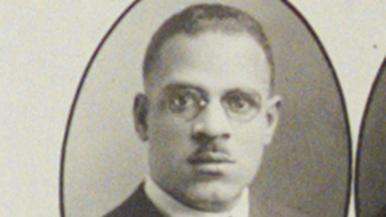When I first learned about Henry Binga Dismond, MD, I was amazed at how much this Black man accomplished in his life. Born in 1891 in Richmond, Virginia, he grew up in an era of legalized segregation and pervasive discrimination against Black people. Despite that systemic racism, Dismond became a pioneering physician, a medical device inventor, a record-breaking athlete, a decorated war hero, a poet, and an advocate for the health of the forgotten in Harlem, Haiti and beyond.
How did he do it all? In my opinion, H. B. Dismond became who he was meant to be by not letting external forces in this world stop him.
One of the first successes that propelled Dismond’s life story forward was his gift at running quarter-mile track. The University of Chicago recruited him, and within a short time he set a Big Ten record that stood for decades. (Yes, U of C was part of the Big Ten then.) Although the 1916 Olympic games were cancelled due to the onset of World War I, Dismond was still awarded a gold medal for his incredible speed.
In 1917, he enrolled at RUSH Medical College to study orthopedic medicine, but soon decided to take a break from his studies to enlist in the U.S. Army. As a soldier in one of three battalions commanded by Black officers, Dismond was cited for his bravery in the trenches of Germany. When he returned home in 1919, he invented a respiratory treatment device called the Radex Steam Infuser, which may even be a precursor for the ventilators we use today.
After Dismond received his medical degree from RUSH Medical College in 1921, he practiced for a short time in Chicago, then moved to New York City, where he specialized in physical therapy. He found great reward in treating the Black residents of Depression-era Harlem who suffered from workplace injuries.
Dismond also founded an organization that sent medical supplies, clothing and shoes to victims of a bloody genocide in Haiti in 1937. His expertise and contributions were so life-changing for the indigenous people that the Haitian president gave him one of the country’s highest honors.
Maybe you’re having the same reaction I had reading Dismond’s long list of groundbreaking accomplishments; it just flows. But you know he had to have encountered barriers because of his race. I was born about 100 years after him, and there are still so many challenges to overcome.
When you’re a Black person, your dreams only go as far as you can “see.” Dismond didn’t see anyone that looked like him doing what he wanted to do, and still, he was unstoppable. That gives me so much pride, and exactly what I need to keep going and achieve my dreams.
Aaron Franklin, DNP, RN, NEA-BC, CMSRN, is the unit director in the general medicine unit at RUSH University Medical Center
Archival photo courtesy of the RUSH University Medical Center Archives.

